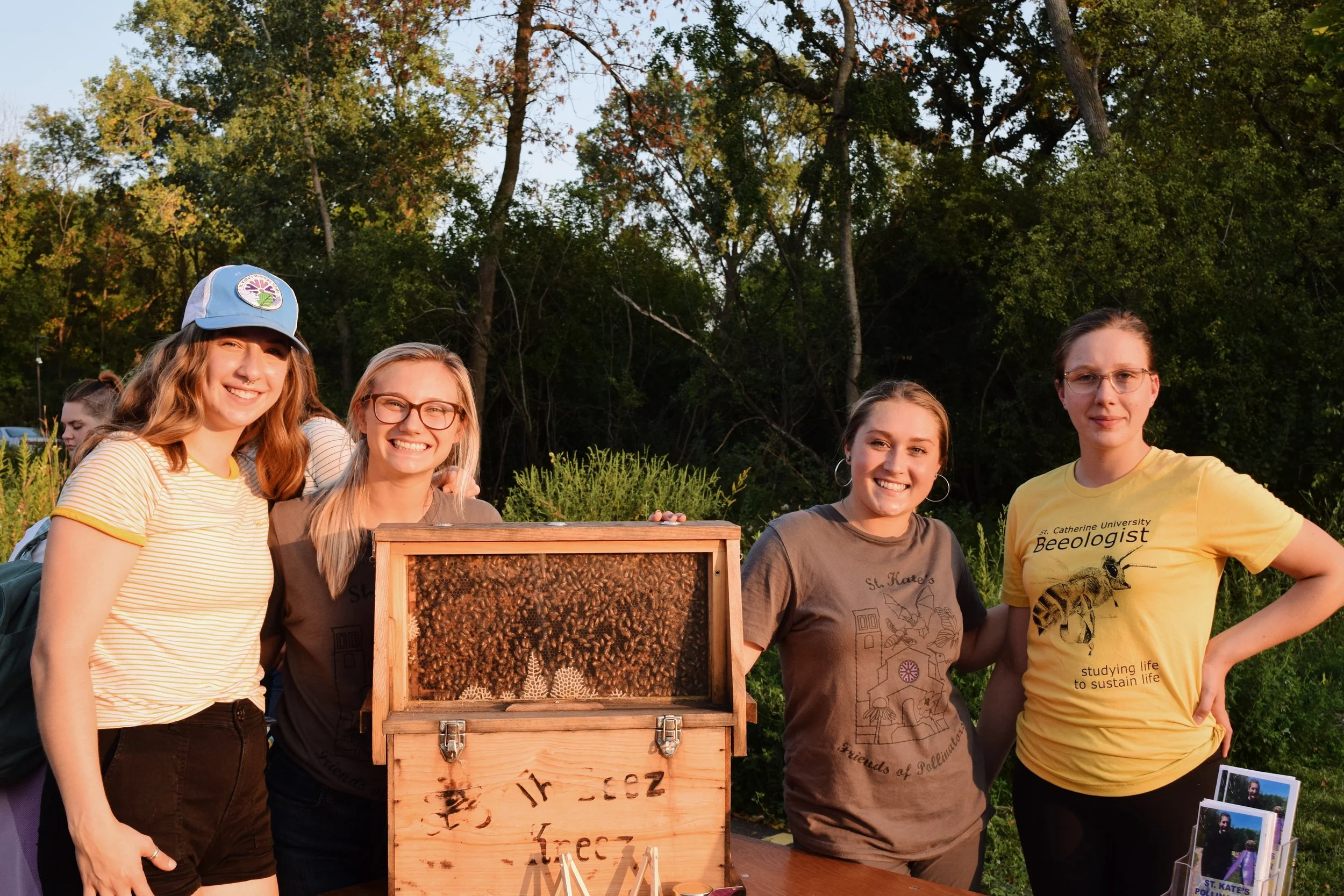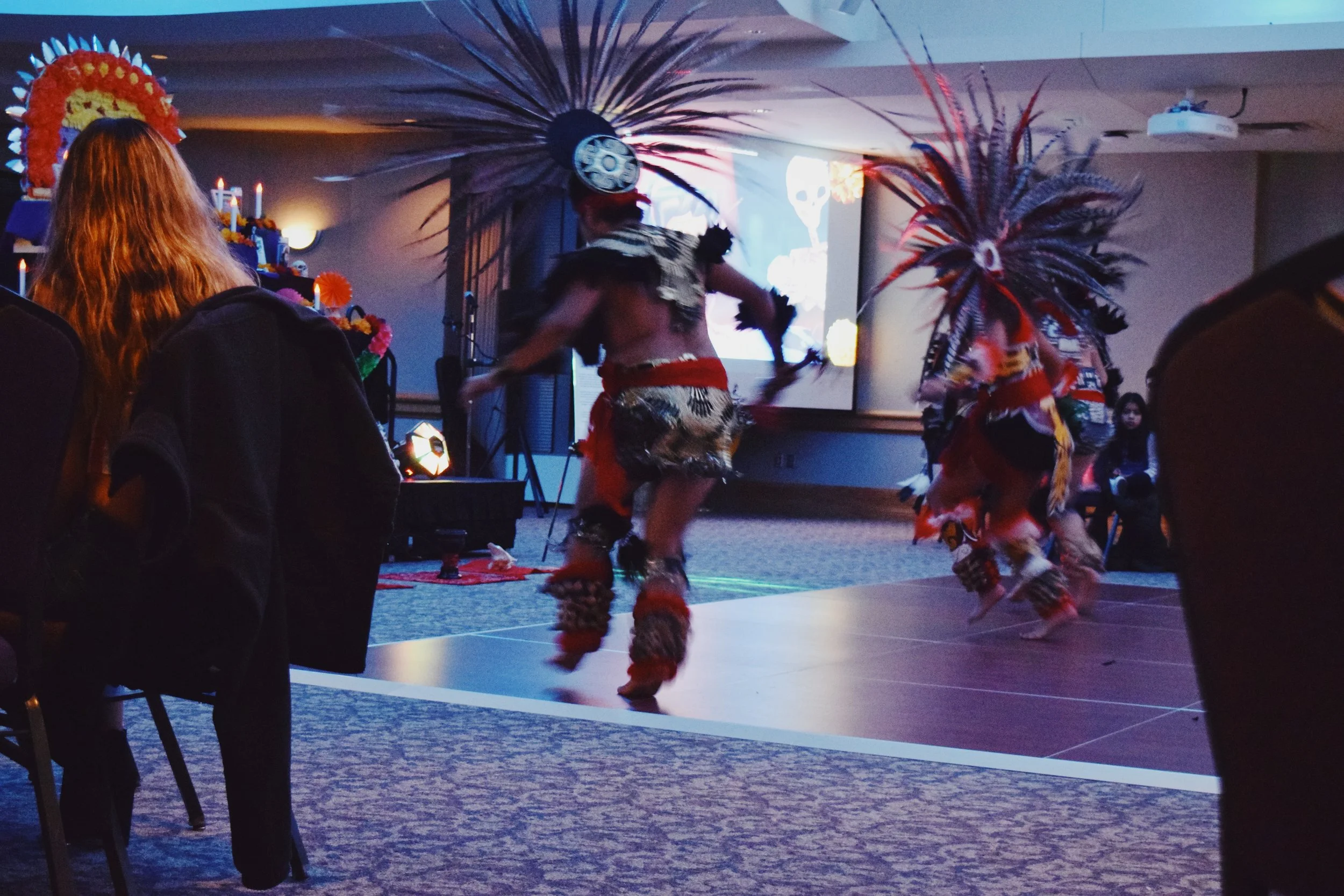Bio Club’s “Pollinator Commons” sees its grand opening
Image above: (Left to right) Bio Club member Claire Weinzierl, co-presidents Kristina Lodahl and Megan Snyder, and member Catherine Lilyerd pose around bees that produce honey on campus
With the bustling start of a new school year, most on-campus clubs are just getting back on their feet. The St. Catherine University Biology Club, however, is already off to a tremendous start. Tuesday, Sept. 17 marked the grand opening of their long-awaited "Pollinator Commons." The Bio Club has been diligently striving to create a pollinator habitat on campus for the past two years.
After Bio Club’s organization of a climate march on campus in 2017, The Sisters of St. Joseph proposed an environmental challenge to encourage student involvement in campus sustainability. Student groups were given the opportunity to present ideas for projects that would lessen the school’s environmental impact. The champion idea would win 500 dollars and the support of the university in realizing their proposal. The Bio Club competed against multiple groups advocating recycling, food waste, and energy usage plans. In the end, The Pollinator Commons won the hearts of the Sisters, and Bio Club was permitted to begin their project.
Students enjoy their first walk on the trail through the Pollinator Commons
After almost two years of deliberation, administration granted Bio Club permission to break ground at the edge of the Dew Drop Parking Lot. With the help of volunteers from Citizen Katie, Bio Club created a path that winds along the edge of the parking lot and into the wooded area surrounding it. The club invested almost 700 dollars into the planting of the Commons' three zones: a butterfly zone, a bee zone, and a honeybird zone. "After all this work," said Biology Professor and Bio Club Advisor, Chris Palahniuk, "we decided that we should tell everyone about it."
Students and community members gather around booths to sample honey and discuss local sustainability efforts.
The grand opening event of the Pollinator Commons hosted a vegan food truck and five tabling groups: Bio Club, Food Justice, The Pollinator Alliance, Minnesota Naturalists, and a pollinator library. The event's mission, as Palahniuk described, was to "provide information on how to get involved in sustainability outside of campus," and to "encourage the gearing of the campus environment toward ecology."
The event itself proved a great success. The food truck sold out in less than an hour, and the tables were bustling with St. Kate's students and community members tasting honey and discussing sustainability with group leaders. When asked about the event's success, Bio Club co-president, Kristina Lodahl, said: "It's amazing to have such a great turnout. But I'm also not surprised – we've put a lot of hard work and passion into this event."
Students like Kristina have assisted in the growth of Bio Club and its support of campus-wide sustainability efforts. When asked about the future of sustainability on campus, Palahniuk replied: "I don't have to do much pushing. Your generation is coming here with far more knowledge, expecting some things from this university. What I'm hoping is that students coming here now are going to come and demand sustainability. This means that change will come quicker than it ever has before."
Palahniuk’s testimony seems quite fitting in the wake of the MN Climate Strike. Bio Club has been working hard since their march in 2017 to engage environmental discussion and action on campus. “We’re like a little city here,” Palahniuk said. “It is our responsibility to protect the ecology of our campus and the surrounding area.” The mission of the Pollinator Commons and the Bio Club is clear: a sustainable environment is crucial to the success of St. Kate's inhabitants, big or small.
If you have suggestions for improving sustainability on campus, contact St. Kate’s Sustainability Coordinators Moe O'Keefe at mokeefe280@stkate.edu and Rachel Schauer at raschauer186@stkate.edu. If membership with the Bio Club interests you, contact Advisor Chris Palahniuk at cgpalahniuk@stkate.edu. The Student Senate Environmental Committee sponsors a “Katies Go Green Challenge” every semester. Contact senate@stkate.edu with suggestions about future sustainability initiatives that would positively impact the St. Kate’s community.








